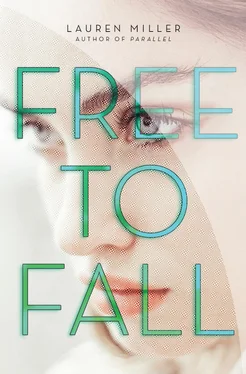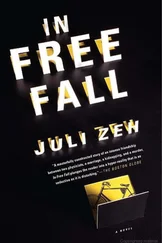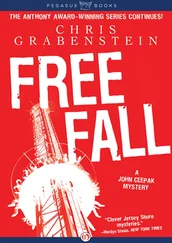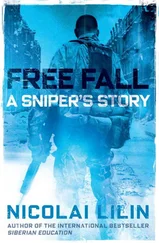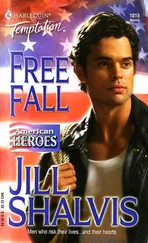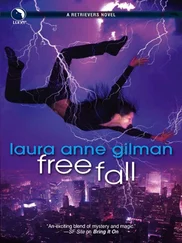Lauren Miller
Free to Fall
In loving memory of my Granny Bea, who would’ve surely been committed for APD
IT CAME IN A PLAIN WHITE ENVELOPE, which made both more and less of its significance. More, because their decision was printed in ink, on thick cotton paper, which felt a little like they’d carved it in stone. Less, because there was nothing about that nondescript rectangle to imply that there was life-changing information inside. The envelope arrived a month after my sixteenth birthday, on an otherwise unmemorable Wednesday afternoon in April. Nineteen and a half hours later it bore an impressive coffee stain and was still unopened.
“Just read it,” Beck said from behind his camera. I heard the rapid fire of his shutter as he held down the release button, his lens angled up at the slanted glass roof. It was lunchtime on Thursday, and we were spending our free period where we always did, in the living room at the Seattle public library, which looked nothing at all like a living room or a library and more like a cross between a greenhouse and a steel cage. It was quarter after one already, which meant we’d probably be late for fifth period again, but neither of us was in a rush to get back. Beck wanted more pictures, and I was too distracted to think about AP Psych.
“I already know what it says,” I replied, turning the envelope over in my hands. “It’s thin. I didn’t get in.”
“All the more reason to open it.” Beck pointed his camera at the girl behind the register at the coffee cart. The lens extended as he zoomed in on her face. My best friend was mildly obsessed with the coffee-stand girl, who was clearly not the least bit interested in the gangly teenage boy who was semi-stalking her.
“If I know what it says, there’s no reason to open it,” I said petulantly.
“Seriously?” Beck said, finally looking me in the eyes. I shrugged. Beck plucked the envelope from my hands and tore it open.
“Hey!” I shrieked, reaching for it. But Beck was already unfolding the letter. A button-size lapel pin slipped from the crease of the letter and onto the floor. I stared as it rolled a few inches and fell on its side. Why would they send a pin unless . . .
“Dear Ms. Vaughn,” I heard Beck say. “We are delighted to inform you that you have been accepted into the Theden Academy Class of 2032. Blah, blah, blah, the rest doesn’t matter because YOU GOT IN!”
“Shh,” hissed the woman across from us, her face pinched in an annoyed glare. She gestured at her tablet. “This is a library .” Without looking at her, Beck pointed his camera at her face and held down the shutter release. “Stop that!” she snapped.
I reached for the fallen lapel pin. It was round and gold and looked like something my grandfather might’ve worn. Then again, I never knew either of my grandfathers so I’m not exactly an authority on their taste in accessories. I slipped the pin into the pocket of my jacket, keeping my fingers on it for safekeeping. Beck was still snapping pictures.
“Please excuse my friend,” I said to the woman apologetically, handing Beck his bag. “He didn’t take his meds today.”
“This is true,” Beck said solemnly. I yanked his arm and pulled him toward the exit.
It wasn’t until we were outside, standing under the Fifth Avenue overhang and feeling the sideways spray of cold, misty rain on our foreheads, that it finally registered: I’d gotten in, which meant I was going. The Theden application process was rigorous, but the attendance process was easy: If you were offered and accepted a spot in the incoming class, they took care of everything else. Travel, lodging, tuition, food. All of it paid for by Theden’s thirty-billion-dollar endowment.
“Let me have it,” I said, taking the letter from Beck’s hand. Needing to see it for myself.
“I knew you’d get in.”
“Yeah, right.”
“Rory, you’ve been taking college classes since eighth grade. You edit Panopticon entries because their historical inaccuracies bug you.”
“I did that once !”
Beck raised an eyebrow.
“Linked pages count as one entry,” I argued.
“Whatever. All I’m saying is that if there were ever a shoo-in for smart-kid school, it’s you.”
But Theden was so much more than smart-kid school. The two-year college prep program—the only of its kind in the country—guaranteed its alumni a free ride to the college of their choice and an executive-level job right after. All you had to do was graduate. Which, from what I’d read, was no small feat. And that was assuming you could even get in. The entire school was only two hundred and eighty-eight kids, occupying sixty acres in a tiny town in western Massachusetts. I’d practically memorized the brochure. “The Theden student knows with unwavering certitude that he belongs in our program,” the first page read, “yet is wise enough to recognize that he is not the best judge of his own capabilities. Thus, the Theden student eagerly submits to the rigor of our application process.” Rigor was right. Four one-thousand-word timed essays, an IQ test, two psychological exams, three teacher recommendations, and one excruciatingly cryptic interview with a member of the admissions committee. It was intense, but then again, getting a degree from Theden was like being handed a golden ticket to life. Had it not been free I couldn’t have applied, but it was, and so I did, unceremoniously, without telling anyone but my dad and Beck. I didn’t have an “unwavering certitude” that I belonged at Theden, just a nagging feeling that I might.
“Your umbrella,” I reminded Beck as he stepped out into the rain.
“Eh. Leave it. It was busted anyway.”
“You can’t just leave your umbrella, Beck.”
“Why not? Because I absolutely need to possess a four-dollar umbrella with two broken spokes?” He tilted his head back and stuck out his tongue. “Plus I’m not sure this cloud spit even counts as rain.”
“You’re just too lazy to walk over there.”
Beck pulled out his handheld, a refurbed Gemini 4. “Lux, am I being lazy right now?”
“I don’t know,” Lux replied in a voice that sounded just like Beck’s. The decision-making app came with a pre-installed voice, but nobody used it. It was so much cooler to hear your own. “I do know that your umbrella is located at the Fourth Avenue entrance. It would take approximately two minutes and twenty seconds to retrieve it at your average walking pace. Would you like to go there now?”
“Nope,” Beck said cheerfully, pocketing his Gemini as he stepped out into the rain.
“I’ll get it,” I muttered. I tucked the letter under my coat and dashed down Madison. Not that I really cared if Beck left his umbrella. But Lux knew how cheap the umbrella was, how close we were to school, how late we were already going to be to fifth period—and yet it still suggested that Beck go back and get it, which meant it might be really important that he did.
Of course, the jerk didn’t wait for me, and in the time it took me to go back for his umbrella, the spit rain stopped. I contemplated running to catch up with him, but I was wearing shitty-traction Toms and didn’t want to ruin my elation about Theden by wiping out on the sidewalk. So I stuck my earbuds in and tapped over to my playlist, letting Lux pick the tracks.
I caught up with Beck a few blocks from school, stopped on the sidewalk, grinning at the image on his viewfinder. He held the camera out for me to see. It was a woman, obviously homeless, her sunken eyes looking straight at the camera. I don’t want your money, her cardboard sign read . Just look at me, so I know I exist. The words and her expression were arresting on their own, but they weren’t what made the photograph so compelling. It was the people in the foreground, the passersby, eyes glued to their phones as they hurried to wherever they were going at lunch hour, completely oblivious to the woman with the sign. “A cop made her move about a minute after I got here,” Beck said. He elbowed me, making a point. “Good thing I ditched the umbrella, right?”
Читать дальше
